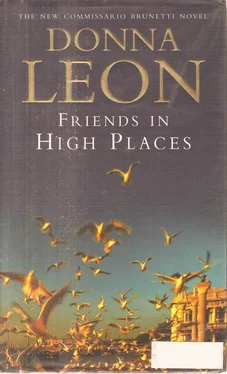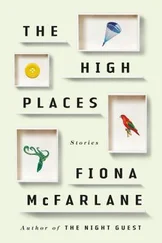‘What is it, Guido?’ she asked but smiled to take any sting from her words.
‘Moneylenders,’ he answered.
She looked up at him, then away, then just as quickly back.
‘Who do you want to know it for?’
‘Me, of course.’
She smiled, but just barely. ‘I know it has to be for you, Guido, but is it for you as a policeman who is going to take a careful look at them or is it only the sort of question a friend asks?’
‘Why do you want to know?’
‘Because if it’s the first, I don’t think I have anything to say to you.’
‘And if it’s the second?’
‘Then I can talk.’
‘Why the difference?’ he asked, then stepped over to the bar and scooped up a few potato chips, more to give her time to think about her answer than because he actually wanted them.
She was ready when he returned. She shook her head at his offer of the chips, so he had to eat them. ‘If it’s the first, then anything I say to you I might have to repeat in court, or you might have to say where you got the information.’ Before he could ask, she continued, ‘If it’s just casual talk between friends, then I’ll tell you whatever I can, but I want you to know that I’ll never remember having said it, should I ever be asked.’ She didn’t smile when she said this, though Franca was usually a woman whose joy in life flowed from her like music from a carousel.
‘Are they that dangerous?’ Brunetti asked, taking her empty glass and reaching over to place it beside his own on the bar.
‘Let’s go outside,’ she said. Out in the campo, she moved over until she stood to the left of the flagpole, just in front of the windows of the bookstore. Whether by accident or design, Franca was at least two metres from the people nearest to her in the campo, two old women leaning toward one another, propped up by their canes.
Brunetti came up and stood beside her. The light rose over the tops of the buildings, making their reflections clearly visible in the window. Unclear and unfocused, the couple in the window could easily have been those teenagers who had, decades ago, often met here for a coffee with friends.
The question came unsummoned, ‘Are you really that frightened?’ Brunetti asked.
‘My son’s fifteen,’ she said by way of explanation. Her level tone might just as easily have been used to comment on the weather or, indeed, upon her son’s interest in soccer.
‘Why did you want to meet here, Guido?’ she asked.
He smiled, ‘I know you’re a busy woman, and I know where you live, so I thought this would be a convenient place: you’re almost home.’
‘That’s the only reason?’ she asked, looking away from the reflected Brunetti to the real one.
‘Yes. Why do you ask?’
‘You really don’t know anything about them, do you?’ was the only answer she gave.
‘No. I know they exist, and I know they’re here in the city. They’d have to be. But we’ve never had any official complaints about them.’
‘And it’s usually the Finanza that deals with them, isn’t it?’
Brunetti shrugged. He had no idea just what the officers of the Guardia di Finanza did deal with: he often saw them, in their grey uniforms decorated with the bright flames of a presumed justice, but he saw little evidence that they did much other than encourage an oppressed people to new methods of tax evasion.
He nodded, not willing to commit his ignorance to words.
Franca looked away from him and around the small campo. Silently, she stood and looked around her. With her chin, she indicated the fast food restaurant that stood on the other side. ‘What do you see?’
He looked across at the glass façade taking up most of that side of the small square. Young people went in and out; many of them sat at small tables, clearly visible through the immense windows.
‘I see the destruction of two thousand years of culinary culture,’ he said, with a laugh.
‘And just outside, what do you see?’ she asked soberly.
He looked again, disappointed that she had not laughed at his joke. He saw two men in dark suits, each with a briefcase in his hand, talking to one another. To the left of them, a young woman stood, handbag clutched awkwardly under her arm as she looked through her address book and tried to punch in a number on her telefonino at the same time. Behind her, a shabbily dressed man, perhaps in his late sixties, tall and very thin, was leaning down to speak to an older woman dressed all in black. She was bent forward with age, her tiny hands grasped tightly around the handle of a large black handbag. She had a narrow face and a long, pointed nose, a combination which, when added to her hunched posture, gave the general impression of one of the smaller marsupials.
‘I see a number of people doing what people do in Campo San Luca.’
‘Which is?’ she asked, looking up at him, eyes sharp now.
‘Meeting by chance or arrangement and talking, then going to have a drink, the way we did, and then going home to lunch, the way we will.’
‘And those two?’ she asked, tilting her chin toward the thin man and the old woman.
‘She looks like she’s on her way home to lunch, just back from a long mass at one of the smaller churches.’
‘And he?’
Brunetti looked over towards them again. They were still deep in conversation. ‘It looks like she’s trying to save his soul and he doesn’t want any part of it,’ Brunetti said.
‘He has none to save,’ Franca said, surprising him that such a judgement should come from a woman he’d never heard speak badly of anyone. ‘Nor does she,’ she added in a cool, unforgiving voice.
She turned a half-step back toward the bookstore and looked into the window again. Keeping her back to Brunetti, she said, ‘That’s Angelina Volpato, and her husband, Massimo. They’re two of the worst moneylenders in the city. No one has any idea when they started, but for the last ten years, they’ve been the ones most people have used.’
Brunetti sensed a presence at their side: a woman had come up to look into the window. Franca said nothing. When she moved off, Franca continued, ‘People know about them and know they’re here most mornings. So they come and talk to them, and then Angelina invites them to their home.’ She paused and then added, ‘She’s the real vampire’, then paused again. When she had grown calm, she went on. ‘It’s there that she calls in the notary and they make up the papers. She gives them the money, and they give her their houses or their businesses or their furniture.’
‘And the sum?’
‘That depends on how much they need and how long they need it for. If it’s only a few million, then they agree to give her their furniture. But if it’s a significant sum, fifty million or more, then she works out the interest – people have told me she can calculate interest in an instant, though the same people have told me she’s illiterate; so’s her husband.’ She stopped here, lost in her own account, then resumed, ‘If it’s a large sum, then they agree to give her title to their house if they haven’t paid her a certain sum by a certain date.’
‘And if they don’t pay?’
‘Then her lawyer takes them to court, and she’s got the paper, signed in front of a notary.’
As she spoke, always keeping her eyes on the covers of the books in the window, Brunetti examined his memory, and his conscience, and was forced to admit that none of this was news to him. The precise details were unknown, perhaps, but not the fact that this sort of thing went on. But it belonged to the Guardia di Finanza, or it had until now, until circumstance and dumb chance had called his attention to Angelina Volpato and her husband, still standing there, across from him, deep in conversation on a bright spring day in Venice.
Читать дальше











